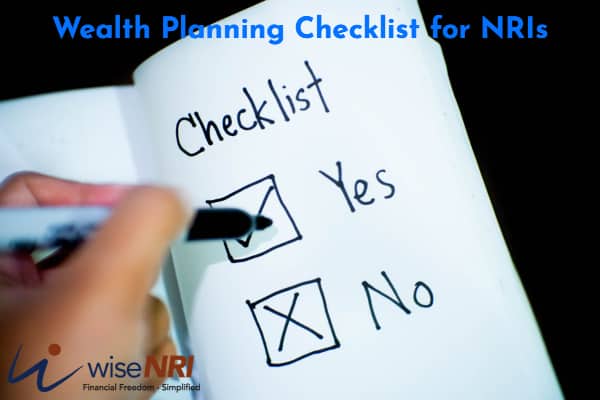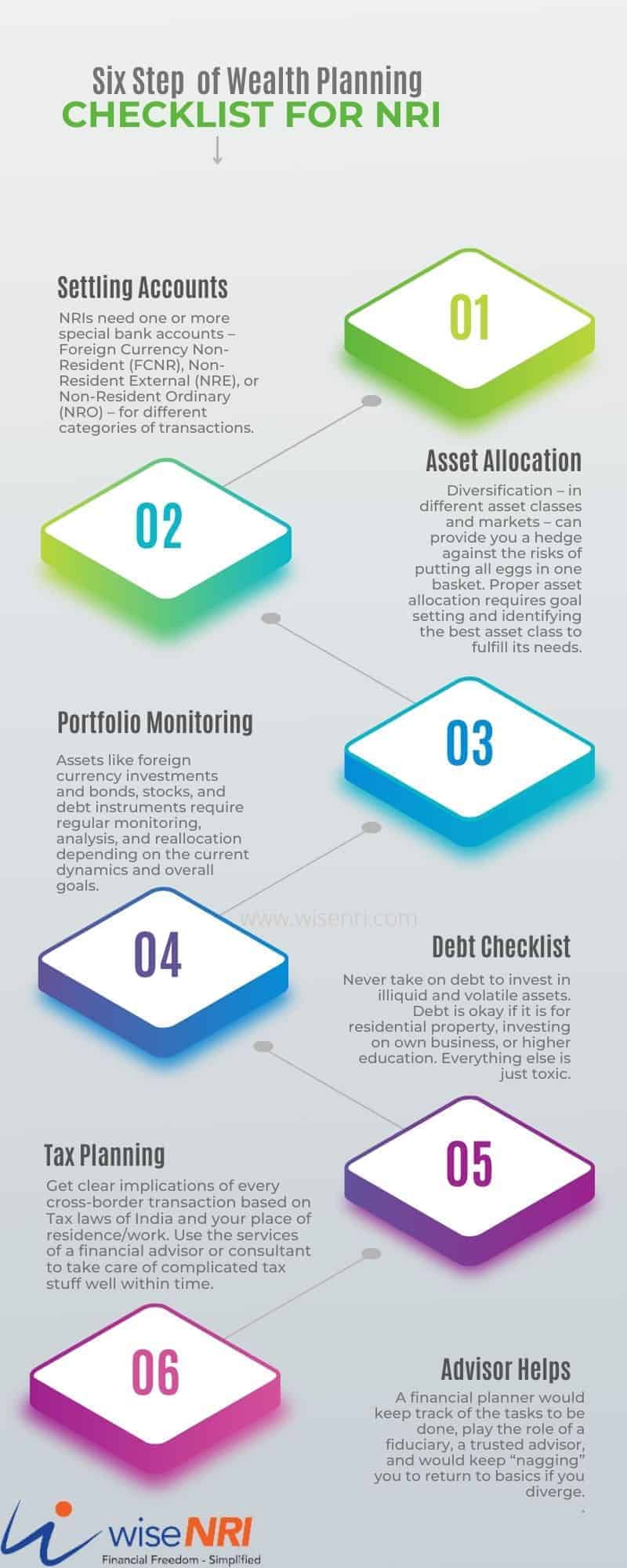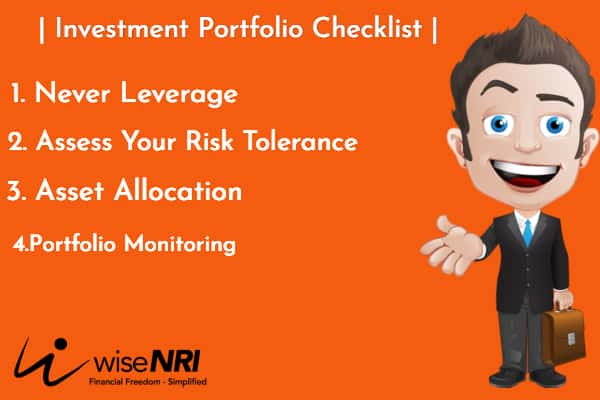Many people take stock of their wealth, assets, and liabilities as an annual ritual usually at the end of the financial year, while filing their tax returns. Though wealth is a static phenomenon – the value of all your assets minus total liabilities at a point in time – its value is affected daily by the market dynamics.
Some black-swan events may affect your wealth substantially within a few days – the global stock market crash and oil prices glut, between February and April 2020; the spectacular rebound since May 2020; and at a more personal level the health scare and possible loss of a loved one.
Many NRI families were completely helpless due to the unfolding events of the global pandemic.

Therefore, if you have not done a wealth check-up until now, it is not too late to get a detailed status report to put things in perspective. More than anyone, NRIs Need Wealth Planning for NRI with their attention, assets, sources of income, and interests spread in multiple tax jurisdictions.
This comprehensive Wealth Planning for NRI checklist can help you start drawing up your personal balance sheet and income statement.
Must Read – NRI Checklist: Going To Be An NRI? Check Your To Do List
NRI Wealth Planning Checklist
Settling Accounts
NRIs need one or more special bank accounts – Foreign Currency Non-Resident (FCNR), Non-Resident External (NRE), or Non-Resident Ordinary (NRO) – for different categories of transactions.
- NRO Account: For making or receiving payments in India and you can repatriate up to USD 1 million from these accounts.
- NRE Account: To deposit overseas funds in India in a rupee-denominated savings account. The balance and earnings of this account are fully repatriable and are not taxable in India. It can also be used to invest in securities in Indian markets.
- FCNR Account: Save foreign incomes in foreign currency denominated term deposits in an Indian bank account. Interest rates of Indian banks are comparatively higher, tax-free, and there is no currency risk involved.

Investment Portfolio Checklist
Never Leverage
Everyone, including NRIs, should keep one rule in mind – never leverage for investments. Many NRIs have made the mistake of borrowing foreign currency and investing it in India without realizing the underlying currency risks.
Assess Your Risk Tolerance
The wild volatility in the share, commodity, and debt markets during 2020 was a litmus test of endurance of the most hardened investors. Many people who were having it great, when the going was good, were left “gasping for breath” as markets tanked.
Therefore, assessing your risk tolerance capacity as early as possible is the best defense to fend against such black swan events in the future.
Must Read-Issues NRIs Face With Their Banks
Asset Allocation
Diversification – in different asset classes and markets – can provide you a hedge against the risks of putting all eggs in one basket. Proper asset allocation requires goal setting and identifying the best asset class to fulfill its needs.
Diversification will help you manage the overall portfolio return, risks, and volatility, as losses in one class could be made up profits in others.
Your asset allocation should respond to the following time durations:
- Emergency Funds – For up to 12 months in cash or equivalents.
- Short-term Needs – From 1 to 3 years in secure term deposits.
- Mid-term Funds – From 3 to 7 years in hybrid funds, gold, and stock options.
- Long-term Funds – For 7+ years in growth stocks, and property.
Never speculate with money earmarked for any goal. If you want a thrill, then use loose change only.
Portfolio Monitoring
Assets like foreign currency investments and bonds, stocks, and debt instruments require regular monitoring, analysis, and reallocation depending on the current dynamics and overall goals. It helps in divesting the investments that have fallen off the course and reinvesting in those that prove their worth.

Must Check – Gift by NRI to Resident Indian or Vice-Versa
Debt Checklist
- Regularly pay off your credit cards bills, never roll over.
- Never take on more than 25-35 percent of your net worth’s equivalent as debt.
- Never take on debt to invest in illiquid and volatile assets. Debt is okay if it is for residential property, investing on own business, or higher education. Everything else is just toxic.
- Get your residential and other properties evaluated for a “Home Equity Line of Credit” or overdraft facility for emergencies.
- Always try to get the best rates and terms on any debt you take. Your credit history has a role to play in it.
- Unless it is a life-or-death emergency, do not try to refinance your debt – it spoils your credit history.
Must Read- Can NRIs get a Car Loan In India?
Wealth Protection and Estate Planning
Wealth protection is as important as wealth creation. If you cannot protect what you created, then what’s the whole point anyway?
As the main bread earner of the family, you have to be responsible for your family even if there is a mishap with you. Risk coverage requires you to identify and look into the face of uncertainties in life – job loss, accident, grave medical mishap, even death.
To protect your family from falling into a financial mess due to anything like that, follow these:
- Keep emergency funds equal to 6 to 12 months of expenses (including loan EMIs and premiums).
- Get adequate health insurance for the entire family. If you plan to return to India in the future, get additional coverage from an Indian insurer.
- Get disability benefits and critical care covers/riders if your job involves too much travel.
- Term insurance to cover all your liabilities and to leave a substantial corpus for your dependents.
- Keep all titles to your assets proper and unencumbered and keep the list updated every six months or on each big transaction.
- Maintain sufficient home, auto, and umbrella insurance coverage.
- Keep your will up to date with clearly defined legal heirs, executors, trustees, healthcare proxy, nominees, and power of attorney holders – with their roles.
Must Check –10 Best NRI Investment Options in India 2022
Tax Planning is must Important in Wealth Planning for NRI
Get clear implications of every cross-border transaction based on Tax laws of India and your place of residence/work.
Continue to make investments in allowed avenues to get maximum possible tax benefit in Indian earnings, and file proper returns to get the advantage of the DTAA. Use the services of a financial advisor or consultant to take care of complicated tax stuff well within time.
Some common tax-saving tips:
- Try avoiding short-term capital gains.
- Keep the portfolio turnover at minimal – only to readjust it – as each transaction has tax implications.
- Max out on contributions to pension funds or retirement plans.
- Contribute as much as possible to invest in allowed tax-saving investments – IRA, 401(k), PPF, etc.
- Buy adequate health insurance for self and family and get regular health check-ups to get deductions.
- Share and save tax by donating to specified charities and trusts.
- If you ae seeing capital losses in taxable accounts, realize them so that they can be offset against future capital gains.
Advisor Helps
Drawing up and keeping an NRI wealth planning checklist is never going to be simple, easy, or uncomplicated. Many people start this task but leave it midway because they are too busy in their lives and as time goes by, the urgency of wealth planning wanes.
A financial planner would keep track of the tasks to be done, play the role of a fiduciary, a trusted advisor, and would keep “nagging” you to return to basics if you diverge.
By taking the help of a financial advisor, you share the responsibility of getting the job done with an expert who can handhold you and your family after you.
You can use the newfound peace of mind in doing things that are most important – taking care of health, being with your family, and creating beautiful memories.
If you would like to discuss your Wealth Plan with us – Schedule Call Now
Now you have some best ideas about how to NRI wealth planning checklist. If you have any questions on NRI wealth management India – feel free to add them in the comment section

How do I know that whether my bank account is link with NRI account or not and how can I cancel it
Hi Vyshp,
Please consult with your Bank.
I am a US based NRI with OCI card and US citizenship can I start a brokerage account in India ?
Yes, you can open a PIS account.
I am Raghunatha reddy. I didnt get a chance to ask my question. My query is my nephew is from india and now US citizen. He has two flats in india purchased when he was working in india and they ate being sold. How he can repatriate this money to US. Money will be more than a crore
As far as I know the NRI has to fill up and submit Form 15CA Format (online application form) and Form 15CB (Chartered Accountant Application) to the bank branch to transfer money from India to a foreign country.USD 1 million per financial year from the NRO account to the NRE account.
myself and my wife both are senior citizens above 70 years of age and stay in USA on green card since last two years. We will shortly visit India for the first time after getting card. We will open NRO account there. (not NRE since we do not earn here and we do not have dollars to transfer to India ) We want to know how can we transfer INR from our bank to USA? What is the limit of money transfer?
Hii Mr Amarsingh
As per my knowledge,USD 1 million per financial year from the NRO account to the NRE account.